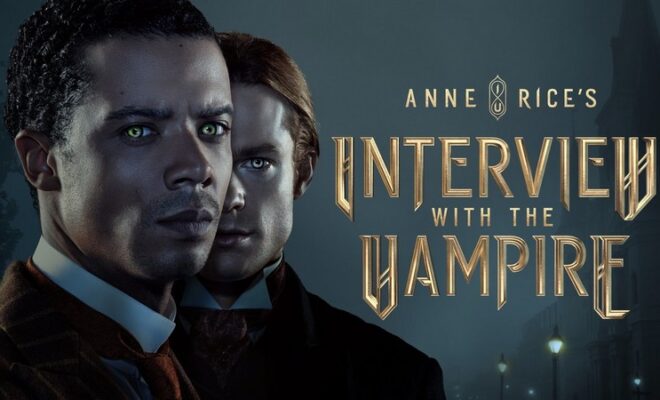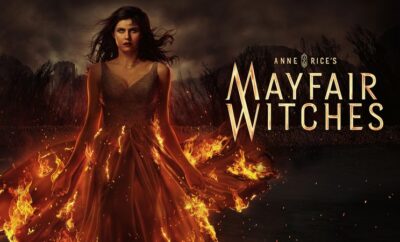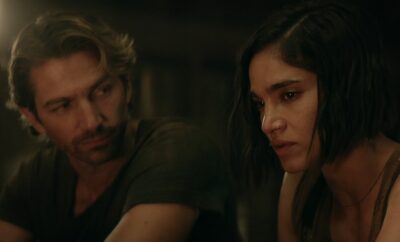
Interviews
Jacob Anderson, Sam Reid & Bailey Bass – Anne Rice’s Interview with the Vampire
By: Jamie Steinberg
Q) So, for the three of you, can you kind of talk about sort of how you balanced what you pulled from the book versus what you added sort of with your own spin on it?
SAM REID: Hello, Jamie, I’ll answer that. No. But I would say that anything for myself and my character, my own spin probably came from my own interpretation of the books and Rolins’ work. So, I wasn’t really trying to put any of my own spin on it. It’s just how I imagined it to be, really.
JACOB ANDERSON: Yeah. I second that. It’s like, you will always view a character through your own lens to an extent and then it’s just kind of, I mean, I guess with anything, it’s like, do other do the other creative people like that, and do they want to discuss it? But you don’t want to mess with this. Like the combination of Anne Rice’s writing and Rolins’ writing, you don’t really want to touch it, you don’t want to just sort of throw your own stuff in just for the sake of it.
SAM REID: They’re so dense already the characters that it sort of would be a shame to try and deviate too much of thing.
JACOB ANDERSON: What could you possibly add?
SAM REID: Yeah.
BAILEY BASS: I feel the exact same way. It’s really, yes, we were cast because there’s something special in us that Rolin and the entire team really enjoyed when we were doing our auditions. But other than that, it’s really just doing the research and the book, reading the scripts, doing our own technique, and then just coming and creating in this world.
Q) Jacob, this is another deeply tortured soul for you to portray. Is there something about these kinds of characters that really draw you to them? Or is this them finding their way to you? Or is it something you see in them that really resonates with you and makes you want to portray them?
JACOB ANDERSON: I think it’s a combination of both. We find each other. I think I’m slightly less like Grey Worm than I am like Louis. But yeah, I mean, I think you normally want to be like very boundaries when you talk about things and be like, “Oh, well, I’m so removed from the character, and I’m brilliant at acting and blah blah blah blah blah”. But to be honest, yeah, I feel very, very connected to Louis. It’s the thing that bothered me about how Anne Rice wrote him, and also how Rolin wrote him as well. Yeah, I’m drawn to characters who are searching. And I’d ask him questions, not just about the world, but about their place in it and what they contribute or don’t contribute to it. But yeah, I also I felt like it would be like, narcissistic of me to be like, “I am the only person who can play Louis.” But namely, because there is somebody else that’s done it, as well. Many people.
Q) Well, I think you brings such a unique take on it, though, because of the artistry you have. Both of these characters that you mentioned, have just been wonderfully nuanced, I think through your portrayal. So it might be just a little bit time for you to pat yourself on the back for what you’ve brought to the role on your own.
JACOB ANDERSON: This one’s for you, Bailey.
Q) So, congratulations on being renewed for season two already, which is great. Do you know when you’ll be start starting to film season two, or have you already started filming it?
JACOB ANDERSON: We haven’t started. We haven’t started shooting no.
SAM REID: Probably, I don’t know if we can say anything.
JACOB ANDERSON: They haven’t not told us anything.
Q) One of the really interesting things about this particular adaptation is the romance that we kind of finally get to see between Louis and Lestat. Can you speak to that a little bit? What does it mean to you to be able to portray that relationship in that way?
SAM REID: Well, I think AMC has the rights to the entire Vampire Chronicles, and so it’s very important to make sure that relationship is established early on. Particularly as the books progress, it becomes much more clear that they are in a very intense romantic relationship. So, I think it’s it’s great to make sure that we’re serving the story correctly. And it wouldn’t be Anne Rice’s Interview with a Vampire if it wasn’t there. So, yeah.
Q) I was wondering, and this is kind of specifically for Bailey and Sam, the show doesn’t shy away from race or that being a factor at all for their very long life experience. Was that important to you? And were you afraid of any ignorant backlash, because previously, the characters were paid by white actors?
BAILEY BASS: I was really excited to play Claudia. It’s really a dream to play such a complex character that’s very loud and unapologetic. I honestly didn’t think twice about anything else. I just knew that Rolin was very intentional about the actors that he wanted to cast in the show, and I’m very fortunate that I was one of them. I just dove into all the research. I read the book. I would cross reference the book and the script and see the quotes that Rolin took from the book and was very intentional about adding them into the script. After doing all the research, I mean, I became Claudia and it was fun to play her.
JACOB ANDERSON: Yeah, I think something that Rolin’s done, which is – I’m almost loath to call it important, but like it creates a richness is that this isn’t a colorblind casting situation. Louis’ central question is about his humanity and his place in humanity. I think that if you were to cast a black actor or black actors for Louis and Claudia, and to not address that, you’d take a lot away from that question of their humanity. I’m glad that we don’t shy away from it. And in terms of backlash, I just don’t want to give it energy anymore. Like I just – people are going to – I think people need to be seen. Sometimes they’ll say anything to be seen or recognized, and it’s sad, but it’s the internet.
Q) I would love for you to talk a little bit about what it’s like just being vampires, being able to play vampires when biting people and having these kinds of scenes. What goes into that and how much fun is that to play? How difficult is that to play?
SAM REID: It’s very fun. It’s very fun. Yeah, you know, because we’ve got a lot of elements that come into every scene. So, they’re very beautiful, sort of rich dialogue-heavy scenes, but we also have this whole element of the vampire, you know, he kills, so we’ll be pausing for the blood to be put in. We had all these different types of blood that we’d been drinking and tasting, and they made us hibiscus flavored blood when we had to drink large amounts of it.
JACOB ANDERSON: It did not taste like hibiscus. It tasted like it was like a Sour Patch Kid.
SAM REID: Yeah.
JACOB ANDERSON: But in liquid form.
SAM REID: But there’s a lot of thought and consideration [that had] gone into this. But yeah, it’s so much fun, really. Vampires are, I think, the best type of monster, because they have so much humanity. They’re so articulate. They experience a huge amount. Anne Rice is responsible for our shift in vampires, because she puts the perspective into the eyes of the monster, and you have empathy for them. So, it’s very fun to do these really extreme, horrific things, but also with a level of understanding and empathy and bringing that into the character. So, it’s a fun thing to do.
JACOB ANDERSON: It’s the best! It’s the best. The best monsters.
Q) So, obviously, you guys do go to some really dark places, though, with your characters. Can you sort of talk about getting into that headspace, and how you sort of, I guess, get back out of it? Is it hard to sort of go there? For all three of you.
BAILEY BASS: Yeah, it’s hard. We had such long days that it kind of, for me personally, it was hard for me to differ[entiate], like, who’s Claudia and who’s Bailey. So, I kind of had to, like really sit with myself and reflect, but it’s hard. But then also, this is what I love to do, and playing such an extreme character, that’s what makes it fun is that I get to relive and be in these spaces that I would never normally be in if I didn’t get to play Claudia. But the dark, even though it’s dark and everything, I definitely enjoyed it. And I had Sam and Jacob, which they were incredible scene partners, and we all had each other. We made sure that throughout the whole process, our mental health, even though we’re like hysterically crying sometimes that afterwards, our mental health was still good,
SAM REID: I think to Bailey’s point, like, sometimes the darkest jobs or the darkest sets where the material is the most bleak are the most fun, because, we instinctively know how to just kind of like, help ourselves through that. So, we’ll be making a lot of jokes. You know, it is ridiculous, sometimes what we’re doing, and you have to step back and think [laughs] You know, we’re suspended in the air, covered in blood, so we just kept it light. It was a fun thing to do.
JACOB ANDERSON: Yeah, I agree. I mean, it’s dense. It’s dense, so you need to focus on the language as well. Like, aside from, yeah, we had a lot of fun, but when you’re doing the scene, you focus on what you’re doing. And I think if you let yourself get dragged into it too much, then hard to to do your job, I think.
Q) Bailey, this is such a beautiful costume you have. Talk about when you first saw what you’d be wearing for the series, and if you had any input, and if it takes really putting on that costume to embody your character.
BAILEY BASS: Costume is one of my favorite things in my job, being able to speak with the costume designer and be able to talk about what she saw when she read the script, because it’s not just me, it’s a big collaboration of an incredible crew that helps make us look good, basically. And to be able to talk to hair, makeup, and costume and get to know what their first ideas were when they read the script, and then being able to collaborate with them and say what I thought, was really, really fun. And the costume designer for this show, Carol, was just so collaborative. I came in and we were talking about posture. That’s a very big thing for Claudia, because in the beginning, she’s like fourteen years old, and she’s excited being a vampire. She would shrug a lot and just walked like, however and had terrible posture. So, the costume designer would think about that when she was making the costumes. And then also I have to look like a little girl. So, she created these beautiful bows along with making sure that the shape of my costumes hid any curves possible. So, when I put them on, I really felt like a little girl. So, when I was doing the scenes where Claudia is struggling, she wants to be a woman, and I’m sitting in this pink dress that it’s not flattering to anything that’s me as Bailey, it was really easy to feel what Claudia would be feeling at that moment.
Q) I really enjoyed the wedding scene and your dancing, Jacob; that was great. Was that actually you dancing? And did you have to train for that, or did you already know how, and will there be any more singing or dancing in the show?
JACOB ANDERSON: That was me and Steven Norfleet, who plays Paul, and we had about a month to train, to practice. I don’t know if you’ve ever done tap dancing, but it’s like learning how to walk again, like how to walk for the first time, like to get your brain to coordinate in that way and to like shift the weight of your body is really confusing. And to add to that we did a lot of our lessons on Sikkim (???). And it’s all like, it’s all sound. You like making music with your feet, but with the lag of, of like, you know, doing it online. But you just drill; you just drill it every day. You drill it every day, and just you have to listen. It’s less about like being mechanical about your body and just like listening to the sound. But there is there is more dancing in the show.
SAM REID: Yeah, the three of us did dancing lessons.
JACOB ANDERSON: Yeah, we did.
Q) I’m curious to just have any of you or all of you talk a little bit about what you love most about the dynamic between all three of your characters, either once Claudia comes in, or kind of as that progresses.
JACOB ANDERSON: I find it, I think from Louis’ point of view, he’s trying to recreate a kind of family dynamic that he is grieving for in his human life. I think it’s probably the thing that he misses most in some ways. It’s like a grounding thing, is his brother and his sister and his mom, maybe to a lesser extent, but maybe not. So, I find the way that it kind of goes for them, and for him, it’s kind of unexpected. I think he wanted, he was hoping that in bringing somebody else into their family, I think he thought that Claudia might be like him. [laughs] So, it’s interesting. I feel like an outcast, but to also be a part of – I mean, I’ll let Bailey talk more about about that part of it, but really, Claudia ends up being sort of forgotten about a little bit, and their dynamic, which is sad.
BAILEY BASS: I think what’s wonderful though, is that there’s really no protagonist or antagonist. It changes through every scene in every episode, because these characters are so specific and complex, and Rolin Jones, the writer of the show, did an incredible job of explaining in depth why we do what we do. There’s a reason why we kill the people that we do, why we hurt each other. And because of that, the viewer kind of feels bad for the person hurting the other, but then also feels bad for the person being hurt.
Q) So, obviously, as vampires, your characters live very long lives. Which era would you like to see, be able to play your character in?
JACOB ANDERSON: 80s 80s 80s. I want the pastels. I want the hair. Let’s go, 80s.
SAM REID: I’d probably do the 1700s. I think Lestat really that is where he’s from, and that’s the era in which he was born into, so I’d quite like to see him in that in that era.
BAILEY BASS: I just want to get to the 50s. Like, I just want Claudia to get to the 50s so I can wear all those skirts and just explore more hairstyles, because we evolved. Doing the prep work, there wasn’t a lot of hairstyles – we had a horrible of time looking for photos of black girls in that time period with very versatile hair, which we know they existed, just no one took pictures of them. So, to be able to expand that more and show women who have curly hair, that this is what they look like in that time. I’d love to expand that and go into the 40s and 50s.
*CONFERENCE CALL*





You must be logged in to post a comment Login